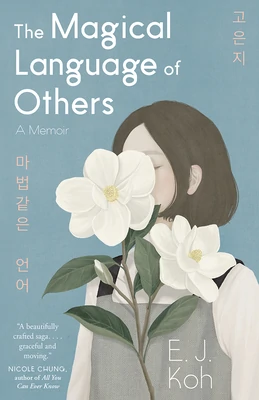
Translating Wordless Longing: A Review of The Magical Language of Others by E.J. Koh
Words By Viengsamai Fetters
Published January 7, 2020 by Tin House Books
This stunning foray into memoir by poet E.J. Koh provides a glimpse of the intimacy between the strokes of her mother’s handwriting and within the author’s own diasporic family relationships. Eun Ji’s parents move back to Korea for work when she is fifteen, leaving her and her brother in California. As contracts are renewed and three years stretch into many more, Eun Ji navigates her mother’s absence and her own growing up; years later she discovers a box with some of the letters her mother wrote her during that time, all left unanswered. The memoir is structured around these letters, forty-nine of them—which, in Buddhist tradition, is the same number of days a soul remains on Earth to seek answers after death.
There’s so much emotional resonance in this book that will appeal to all sorts of people, but for me, as an Asian American, Koh creates out of her own story something I didn’t know I needed. Her mother’s handwritten pages are scanned into the book following their translations, and holding them in my hands provided a strange familiarity; I can’t read Korean, but seeing where the letters switch into English and how Eun Ji’s mother writes to her daughter reminds me so much of how my grandmother speaks to my mother and how my mother speaks to me.
The first page of the book is a translator’s note, but it’s more than a note on the way she translates her mother’s letters—it’s a note on how she translates life to the page. Koh’s writing doesn’t scaffold itself with whiteness; instead she grounds herself in her own lineage and shines through an exquisite command of language and deep love. She holds each person in the memoir with grace and attention to detail, and she permits them to retain their own complexities while acknowledging the privilege of reflection in allowing it.
There’s a remarkable balance of lightheartedness and contemplation in this book, and Koh doesn’t pit them against one another. Every section is carefully chosen and masterfully told; her stints on a hip-hop dance crew and as a student in Japan tell us as much of her story as her first poetry class and her journey to becoming a translator. Koh shows us Eun Ji in all of her different lives, and understands that a story about her would be incomplete without including them, even the parts lived by other people.
Koh not only writes her own life, but also traces her histories and the sites of generational trauma, including the experiences of both her grandmothers; she handles their stories with such delicacy, eliding neither atrocity nor joy. To me, she built a bridge. The Magical Language of Others creates indescribable connection, like I felt first reading Maxine Hong Kingston’s The Woman Warrior, and helped me cradle my own wordless longing to piece together knowledge of my own family’s fractured lives during and after the Vietnam War. Over the course of the book, Koh deftly weaves her own story of survival with her mother’s and her grandmothers’; I ached alongside her, reflecting on how much of our family history lives on in us.